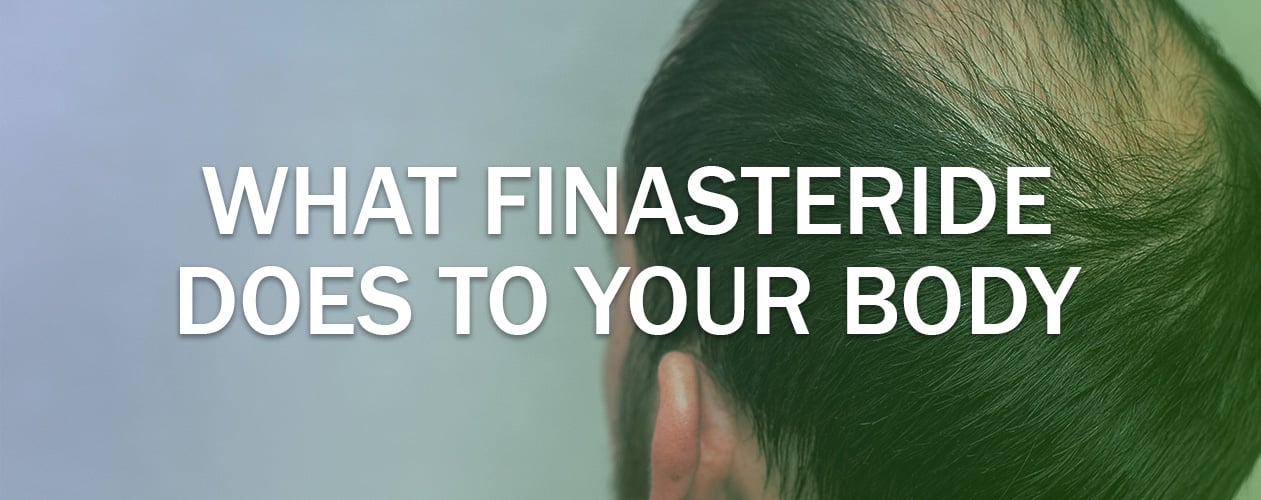What Finasteride Does To Your Body

Finasteride is an oral treatment available in the UK for Male Pattern Baldness (MPB). This is a genetic condition where a man can experience hair loss and a receding hairline which can be stressful for some while others regard it as ‘growing old gracefully’. However, it is not necessarily limited to men who are older; studies have shown that younger men in their thirties and forties also experience going bald too.
The signs to say that you are losing hair:
- Noticing the appearance of thinning hair or a receding hairline yourself
- Other people informing you that you are losing your hair (you don’t notice yourself)
- Excessive hair on the pillow, shower bed or bath plug, or on your hands when styling your hair
Treatment of Male Pattern Baldness
Probably the most popular medicine available for the treatment of MPB is Finasteride 1mg tablets which are clinically proven to stop further hair loss and promote hair re-growth.
Click HERE to View Finasteride Prices > >
Mechanism of action
Finasteride works by blocking an enzyme called 5-alpha-reductase which normally produces dihydrotestosterone (DHT), a more potent form of testosterone. By blocking its action it can, therefore, reduce the levels of dihydrotestosterone in the body. Studies show that finasteride blocks about 64% of DHT — enough to significantly slow or even stop, hair loss in most men.
Dihydrotestosterone normally causes a number of effects in the body:
- Prostate growth
- Hair loss in men due to shrinkage of follicles and hair thinning
So by blocking this hormone and reducing its levels, there will be fewer hair follicles that are shrunk by dihydrotestosterone and therefore more hair is retained. Finasteride will increase the amount of scalp hair but will not have any effect on body hair. In addition, if the prostate is enlarged such as in the condition ‘Benign Prostatic Hyperplasia’, the prostate can shrink and improve symptoms in such conditions.
The effects of Finasteride – what will it do to my body?
The effect of finasteride on the prostate and scalp will only last as long as the medicine is taken. When it is stopped, the prostate begins to grow again and the scalp hair will be lost. This is because finasteride works by blocking the specific enzyme responsible for DHT, so will only prevent hair loss while the drug is active in your body. Once you stop taking finasteride and you are particularly genetically prone to male pattern baldness, the DHT will once again start to affect your hair follicles resulting in thinning of the hair on your scalp, hairline recession and other male pattern baldness effects.
It may take at least 3 months to see an effect for hair retention and growth on the scalp so persistence and patience are important! It will not cure hair loss, but it will cause scalp hair to grow. The hair growth will only last as long as the medicine is used and any new hair will be lost within 1 year after the medicine is stopped. Hair growth on other parts of the body isn’t affected.
Some of the side effects that can occur with finasteride include:
- decreased sex drive
- trouble getting or keeping an erection
- ejaculation disorder
- increase in breast size and tenderness
- skin rash
If these effects are mild, they may disappear within a few days or a couple of weeks however if they become persistent then make an appointment and see your doctor. Women and children should not use this medicine. Women who are pregnant or may become pregnant should not handle crushed or broken tablets. This is because Finasteride can be absorbed through the skin and cause birth defects in male babies. If a woman does come in contact with this medicine, the affected area should be washed right away with soap and water.
Finasteride may cause a decrease in the amount of semen you ejaculate during sex and this may cause difficulty in conceiving.
There have been some studies that show finasteride is a safe, effective hair loss treatment with few, mild side effects. However, a small percentage of men that use finasteride might experience side effects such as depression and short-term sexual dysfunction.
Of these side effects, sexual dysfunction is the most common, with finasteride use increasing the risk of erectile dysfunction and reduced libido (reduced sex drive) for some men. However, most men can quite easily treat this side effect by taking oral treatment for erectile dysfunction and if you do experience this side effect you should discuss with your doctor about how to manage it.
Currently, data regarding long-term side effects from finasteride is mixed. FDA study data shows that the vast majority of men that experience side effects from finasteride also notice that these side effects stop when they stop using the medication. However, a small number of men that use finasteride report long-term side effects that continue after they stop taking the medication. At this point, most studies (including a 2012 study of men with recurring side effects from finasteride) view this aspect of finasteride usage as an area of active research.
So, What Happens if You Stop Taking Finasteride?
As mentioned earlier, once you stop taking finasteride, you can expect that the hair you’ve grown will begin to fall out. This is because Finasteride only works while the drug is active in the body, meaning you’ll go back to a normal rate of hair loss once it’s excreted out of the body and is no longer active.
Is Finasteride Safe to Use Long Term?
Since finasteride only prevents hair loss while it’s active in your body, you’ll need to use it over the long term if your goal is to stop baldness and keep as much of your hair as possible. So persistence and patience is key!
For many men, this means taking finasteride for life. A study from the Prostate Cancer Prevention Trial states that there is “little need to worry” about any long-term consequences from finasteride.
Other long-term studies of finasteride show similar results, with a 1mg dose of finasteride well tolerated over a period of five years in a 2002 study.
How should I take finasteride?
- For Male Pattern Baldness, Finasteride is prescribed as a 1mg oral tablet, once a day and should be taken with a full glass of water. Take the medicine at the same time each day, with or without food.
- Follow all directions on your prescription label and read all medication guides or instruction sheets. Use the medicine exactly as directed.
- Use finasteride regularly to get the most benefit.
- It may take up to 3 months or longer before you receive the full benefit of taking finasteride. Your doctor will determine how long to treat you with this medicine. Keep using the medication as directed.
- You will need frequent blood tests. Your doctor will also test your prostate specific antigen (PSA) to check for prostate cancer.
- Store at room temperature away from moisture, heat, and light. Keep the bottle tightly closed when not in use.
What happens if I miss a dose?
Take the medicine as soon as you can, but skip the missed dose if it is almost time for your next dose. Do not take two doses at one time.
Benefits of taking Finasteride for Male Pattern Baldness
- Convenient administration – one tablet is taken once a day.
- Effective in most men – the vast majority of men using Finasteride do experience some benefit from its use.
- Stops hair loss from progressing.
- It can help regrow lost hair.
- Beneficial side effects for some men such as the shrinking of the prostate gland in men susceptible to an enlarged prostate.
- There is no other effective oral treatment currently on the market, used to treat male pattern baldness.
Click HERE to View Finasteride Prices > >
References
- www.forhims.com
- www.mayoclinic.org/finasteride
- www.BNF.org/finasteride
- www.nhs.org
Assured Pharmacy is not liable for the currency or accuracy of the information contained in this blog post. For specific information about your personal medical condition, please contact our doctors or pharmacists for advice on [email protected]


